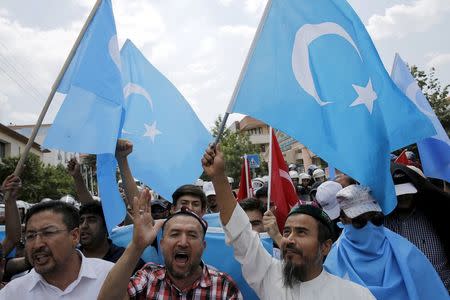China says Uighurs being sold as "cannon fodder" for extremist groups

By Ben Blanchard BEIJING (Reuters) - Uighurs from China's Xinjiang are being given Turkish identity papers in Southeast Asia by Turkish diplomats and then taken to Turkey where some are sold to fight for groups like Islamic State as "cannon fodder", a senior Chinese official said. Beijing says the Turkic language-speaking Uighur minority are firstly Chinese nationals, and those who flee China should be returned to their home region in the far west of the country bordering central Asia. "Turkish embassies in Southeast Asia will give them proof of identity," Tong Bishan, division chief of the Ministry of Public Security's Criminal Investigation Department, told a small group of foreign reporters in Beijing on Saturday. "They are obviously Chinese but they will give them identities as Turkish nationals." The accusation is likely to further anger Ankara, already alarmed by the return of more than 100 Uighurs to China from Thailand this week. Some Turks see themselves as sharing a common cultural and religious heritage with their Uighur "brothers". Hundreds, possibly thousands, of Uighurs keen to escape unrest in China's western Xinjiang region, have travelled clandestinely via Southeast Asia to Turkey. China is home to about 20 million Muslims spread across its vast territory, only a portion of whom are Uighurs Tong said that hundreds of Uighurs had been given documents by Turkish diplomats, especially in Kuala Lumpur, and then allowed into Turkey. Neither the Turkish Foreign Ministry nor the Turkish embassy in Kuala Lumpur were able to immediately provide comment. YOUTHS BRAINWASHED But upon arriving, they have no chance of finding legal work and some end up with extremist groups, Tong said, like the East Turkestan Islamic Movement, which Beijing accuses of waging an insurrection campaign in Xinjiang to set up their own state. "They are very easily controlled by certain local forces, especially the East Turkestan Islamic Movement and other terrorist groups. They organise the youths, they brainwash them, and get them to the front line to fight. They are cannon fodder," Tong said. "There is competition for them. Some are sent to Iraq, some to Syria. The terrorist groups there lack people. They will snatch people away. The terrorist groups will pay, at least $2,000 a person. It's their way of recruiting soldiers." Tong, who has been helping lead the Chinese effort to get Uighurs in Southeast Asia back to China, said he did not know how many Uighurs were now fighting for Islamic State. But he said that they have found propaganda videos and messages on the mobile phones and computers of some of those who have been returned, including pictures of dead fighters and promises of the joys to come in the afterlife. "We are providing education and support, to tell them what real Islam is about. They've been listening to and watching stuff on the Internet, from irregular imams." ATTEMPT TO 'DEMONIZE' CHINA Numerous groups have been sent back to China this year from Southeast Asia, Tong said, including the 109 repatriated from Thailand this week. He did not have a full figure for the numbers deported. The deportations have sparked sometimes violent protests in Turkey, home to a large Uighur diaspora. The United States and United Nations have condemned the deportations and asked Thailand to stop them, saying the Uighurs could face harsh treatment in China. Beijing denies the accusations of human rights groups that it restricts the Uighurs' religious freedoms. It blames Islamist militants for a rise in violent attacks in Xinjiang in the past three years in which hundreds have died. Tong said that concern the Uighurs would be mistreated upon their return was simply an attempt to "demonize" China, and said they were being well looked after, though those suspected of crimes will be prosecuted. (Additional reporting Yantoultra Ngui in Kuala Lumpur and Ece Toksabay in Ankara; Editing by Jeremy Laurence)

